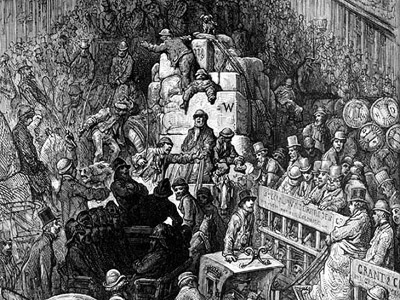It is one week till the season of lent, a much under-valued (by most Unitarians) time of reflection and repentance. This from James Freeman Clarke on what we are capable of...
"The goodness of the best man is nothing, compared with the goodness which the worst man is capable of attaining. This is a point in Christianity which we are slow to comprehend. We overvalue present attainment; we undervalue inherent capability. The small house suited to our present convenience, and finished in a year, we value more than the vast palace, the enormous cathedral, the metropolitan city, whose great plan it will require centuries to execute. Esau, selling his birthright for a mess of pottage, is the type of those who despise the common human nature which is in every man, and idolize the talents of this or that brilliant person, here or there.
Jesus did not so. Jesus reverenced the great nature which he saw in the soul of every man. Therefore he reverenced the child whose unpolluted soul still beheld the face of God. Therefore he looked with tenderness on the sinner, —spoke words of loftiest truth to the most humble and called upon the common crowd to be perfect, as their Father in heaven was perfect. Therefore he demanded of all, as the only essential thing, to turn their faces the right way in faith, to have courage, to believe in God and in themselves. In this conception of the possibilities of man, the roots of all great Christian ideas find nourishment. Love to God is strengthened when our love is not abject, but hopeful, flowing from the consciousness of what he has made us to be. Love to man is possible only when we see in every man the capacity of goodness, beauty, and power. We can love the sinner when the actual sin appears superficial, and the possible goodness radical. We can forgive an enemy when we see that this enemy, by means of our forgiveness, may not only become our friend, but the friend of God. We can look on ourselves with humility and yet with hope, on the prosperous without envy, on the sufferer without too sickly a sorrow, on our trials with patience, and our successes without elation, when we consider how little all these things are in comparison with the universal soul which is in all, with its boundless capacities, with its glorious destiny."
"The goodness of the best man is nothing, compared with the goodness which the worst man is capable of attaining. This is a point in Christianity which we are slow to comprehend. We overvalue present attainment; we undervalue inherent capability. The small house suited to our present convenience, and finished in a year, we value more than the vast palace, the enormous cathedral, the metropolitan city, whose great plan it will require centuries to execute. Esau, selling his birthright for a mess of pottage, is the type of those who despise the common human nature which is in every man, and idolize the talents of this or that brilliant person, here or there.
Jesus did not so. Jesus reverenced the great nature which he saw in the soul of every man. Therefore he reverenced the child whose unpolluted soul still beheld the face of God. Therefore he looked with tenderness on the sinner, —spoke words of loftiest truth to the most humble and called upon the common crowd to be perfect, as their Father in heaven was perfect. Therefore he demanded of all, as the only essential thing, to turn their faces the right way in faith, to have courage, to believe in God and in themselves. In this conception of the possibilities of man, the roots of all great Christian ideas find nourishment. Love to God is strengthened when our love is not abject, but hopeful, flowing from the consciousness of what he has made us to be. Love to man is possible only when we see in every man the capacity of goodness, beauty, and power. We can love the sinner when the actual sin appears superficial, and the possible goodness radical. We can forgive an enemy when we see that this enemy, by means of our forgiveness, may not only become our friend, but the friend of God. We can look on ourselves with humility and yet with hope, on the prosperous without envy, on the sufferer without too sickly a sorrow, on our trials with patience, and our successes without elation, when we consider how little all these things are in comparison with the universal soul which is in all, with its boundless capacities, with its glorious destiny."





0 ટિપ્પણી(ઓ):
ટિપ્પણી પોસ્ટ કરો